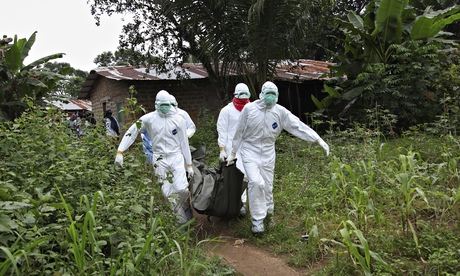
Liberian nurses carry the body of an Ebola victim on the way to bury them in the Banjor community on the outskirts of Monrovia, Liberia. Photograph: Ahmed Jallanzo/EPA
Barack Obama has said a global effort is required to combat the spread of Ebola which he blamed on weak and overwhelmed health systems in west Africa.
Speaking at the end of a summit of African leaders in Washington, the president said the disease – which has claimed the lives of more than 900 people in Liberia, Sierra Leone and Guinea – can be controlled and contained with the right resources. A single case has also been confirmed in Nigeria.
"The Ebola virus both currently and in the past is controlled if you have a strong public health infrastructure in place and countries that have been affected are first to admit that what's happened here is their public health systems have been overwhelmed. They weren't able to identify and then isolate cases quickly enough," he said. "You did not have a strong trust relationship between some of the communities that were affected and health workers. As a consequence it spread more rapidly."
Obama said the US is working with European countries and the World Health Organisation (WHO) to respond to the crisis. The US centres for disease control moved Ebola to its highest category of health threat.
"Let's get all the health workers we need on the ground. Let's help to bolster the systems that there are in place. Let's nip as early as possible any additional outbreaks of the disease," he said.
But the president said it was too early to decide whether an experimental drug given to an American health worker who contracted Ebola and has been flown back to the US could be distributed in Africa.
Obama said the Ebola outbreak was discussed in his collective meetings with African leaders behind closed doors on the third and final day of the largest summit of the continent's governments held in Washington. He said that one consequence was a decision to establish an African centre for disease control. HIV/Aids was also on the agenda with a plan to double the number of children receiving life saving antiretroviral drugs.
Obama described the summit as an "extraordinary event" which promoted trade and discussed issues ranging from combatting corruption to women's rights and freedom of the press. The president said there was common agreement on the need to deepen security cooperation against terrorism because of spreading violent instability in parts of the continent, from Boko Haram in Nigeria to the al-Shabab in Somalia which is destabilising neighbouring Kenya.
"The United States doesn't have a desire to expand and create a big footprint inside of Africa," he said.
Instead, the president said Washington will back a "new security governance initiative" to strengthen security forces of African countries.
"We're starting with Kenya, Niger, Mali, Nigeria, Ghana and Egypt," he said.
But human rights groups say that anti-terrorism strategies and laws in countries such as Ethiopia and Kenya are increasingly used in parts of Africa to suppress political activity and the press, and that American-backed security forces in Nigeria and Kenya are responsible for attacks on civilians and other abuses.
Obama defended the relationships.
"Many times we will work with countries even though they're not perfect on every issue. We find that in some cases engaging in a country that in general is a good partner but is not conforming optimally when it comes to all the various categories of human rights, we can be effective by working with them on certain areas and criticising them and trying to elicit improvements in other areas," he said.
But the president acknowledged that the fight against armed groups is undermined when government forces assault the civilian population, such as accusations by human rights groups that the Nigerian military has massacred innocent people and destroyed property in its war with Boko Haram.
"One of the encouraging things in the sessions was a recognition that fighting terrorism also requires security forces that are professional, that are disciplined, that are themselves not engaging in human rights violations," he said. "That part of the lesson we've all learned about terrorism is that it's possible in reaction to terrorism to actually accelerate the disease if the response is one that alienates populations or particular ethnic groups or particular religions."
Demonstrators from several African countries gathered not far from the State Department where the summit was meeting. Jacques Miango from the Democratic Republic of Congo accused Obama of abandoning a commitment to support "strong institutions not strong men" by inviting president Joseph Kabila.
"Now in Congo we have a strong man not strong institutions. We are here to see if Obama will keep his word," he said.
The US says that the secretary of state, John Kerry, met Kabila on Monday and told him that Washington expects him to abide by Congo's constitution and leave power after two terms as president in 2016.
Protestors from Burkina Faso pressed home a similar message over president Blaise Compaoré who they accuse of attempting to change his country's constitution to extend his 27 year rule.
Demonstrators from Ghana stood across the street demanding that Obama get President John Mahama to account for $30bn in loans in recent years.
"No water, no electricity. Is this the better Ghana?" said one sign.
Several African leaders cancelled scheduled press conferences at the end of the summit, including South Sudan, Somalia and Tanzania. Others said they would only speak to the official press from their own nations.



No comments:
Post a Comment